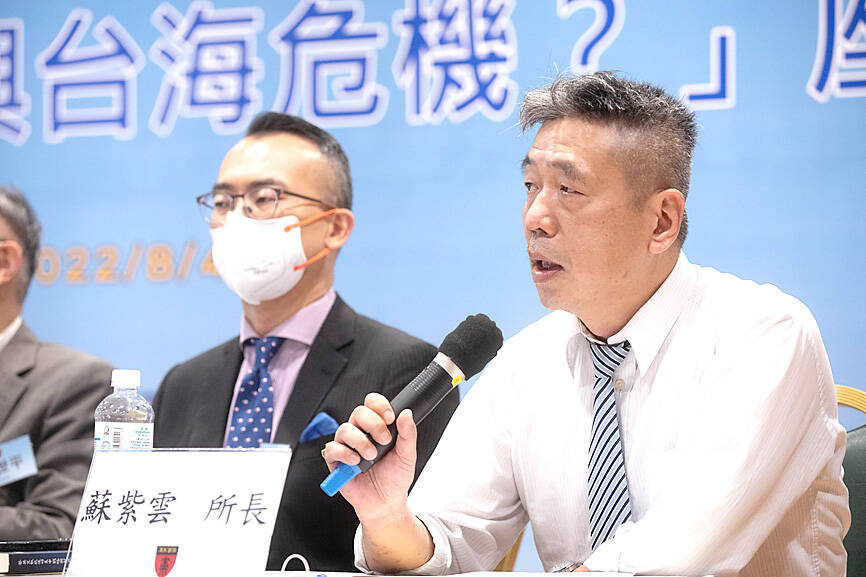Taiwan should strengthen infrastructure, stock up on reserves and step up efforts to encourage Taiwanese to fight against an enemy, legislators and experts said on Tuesday last week.
The comments sought to summarize what the nation should learn from the Russian invasion of Ukraine, which has exceeded 300 days, since Feb. 24 last year.
Institute of National Defense and Security Research fellow Su Tzu-yun (蘇紫雲) said that the war in Ukraine highlighted the importance of being ready for war.

Photo: CNA
Taiwan’s development of an “asymmetrical warfare” doctrine and extending mandatory conscription to one year is a good start to preparation of defense against a possible Chinese invasion, he said.
War games simulated by the Washington-based think tank Center for Strategic and International Studies (CSIS) showed that while Chinese success in landing operations in Taiwan would be extremely low, as it is an island, it would be unable to receive aid like Ukraine, Su said.
The nation needs to inventory supplies, strengthen infrastructure such as underground railways, and repurpose abandoned tunnels for arms stockpiles, Su said.
Taiwan is prone to having its supply routes cut off, and it should acquire all supplies and equipment it needs before any war begins, Democratic Progressive Party Legislator Wang Ting-yu (王定宇) said.
Taiwan should attempt to improve its military hardware, and learn how to use its anti-ship and anti-air missiles better, Wang said, adding that the nation could also seek assistance from the US in bolstering its stockpile of precision munitions, as well as help in increasing missile range and accuracy.
As per the CSIS war games, if Taiwan were without US or Japanese aid at the start of an invasion, it is possible that it would have to hold its own for at least 70 days, Wang said.

Taiwan is stepping up plans to create self-sufficient supply chains for combat drones and increase foreign orders from the US to counter China’s numerical superiority, a defense official said on Saturday. Commenting on condition of anonymity, the official said the nation’s armed forces are in agreement with US Admiral Samuel Paparo’s assessment that Taiwan’s military must be prepared to turn the nation’s waters into a “hellscape” for the Chinese People’s Liberation Army (PLA). Paparo, the commander of the US Indo-Pacific Command, reiterated the concept during a Congressional hearing in Washington on Wednesday. He first coined the term in a security conference last

A magnitude 4.3 earthquake struck eastern Taiwan's Hualien County at 8:31am today, according to the Central Weather Administration (CWA). The epicenter of the temblor was located in Hualien County, about 70.3 kilometers south southwest of Hualien County Hall, at a depth of 23.2km, according to the administration. There were no immediate reports of damage resulting from the quake. The earthquake's intensity, which gauges the actual effect of a temblor, was highest in Taitung County, where it measured 3 on Taiwan's 7-tier intensity scale. The quake also measured an intensity of 2 in Hualien and Nantou counties, the CWA said.

The Overseas Community Affairs Council (OCAC) yesterday announced a fundraising campaign to support survivors of the magnitude 7.7 earthquake that struck Myanmar on March 28, with two prayer events scheduled in Taipei and Taichung later this week. “While initial rescue operations have concluded [in Myanmar], many survivors are now facing increasingly difficult living conditions,” OCAC Minister Hsu Chia-ching (徐佳青) told a news conference in Taipei. The fundraising campaign, which runs through May 31, is focused on supporting the reconstruction of damaged overseas compatriot schools, assisting students from Myanmar in Taiwan, and providing essential items, such as drinking water, food and medical supplies,

New Party Deputy Secretary-General You Chih-pin (游智彬) this morning went to the National Immigration Agency (NIA) to “turn himself in” after being notified that he had failed to provide proof of having renounced his Chinese household registration. He was one of more than 10,000 naturalized Taiwanese citizens from China who were informed by the NIA that their Taiwanese citizenship might be revoked if they fail to provide the proof in three months, people familiar with the matter said. You said he has proof that he had renounced his Chinese household registration and demanded the NIA provide proof that he still had Chinese